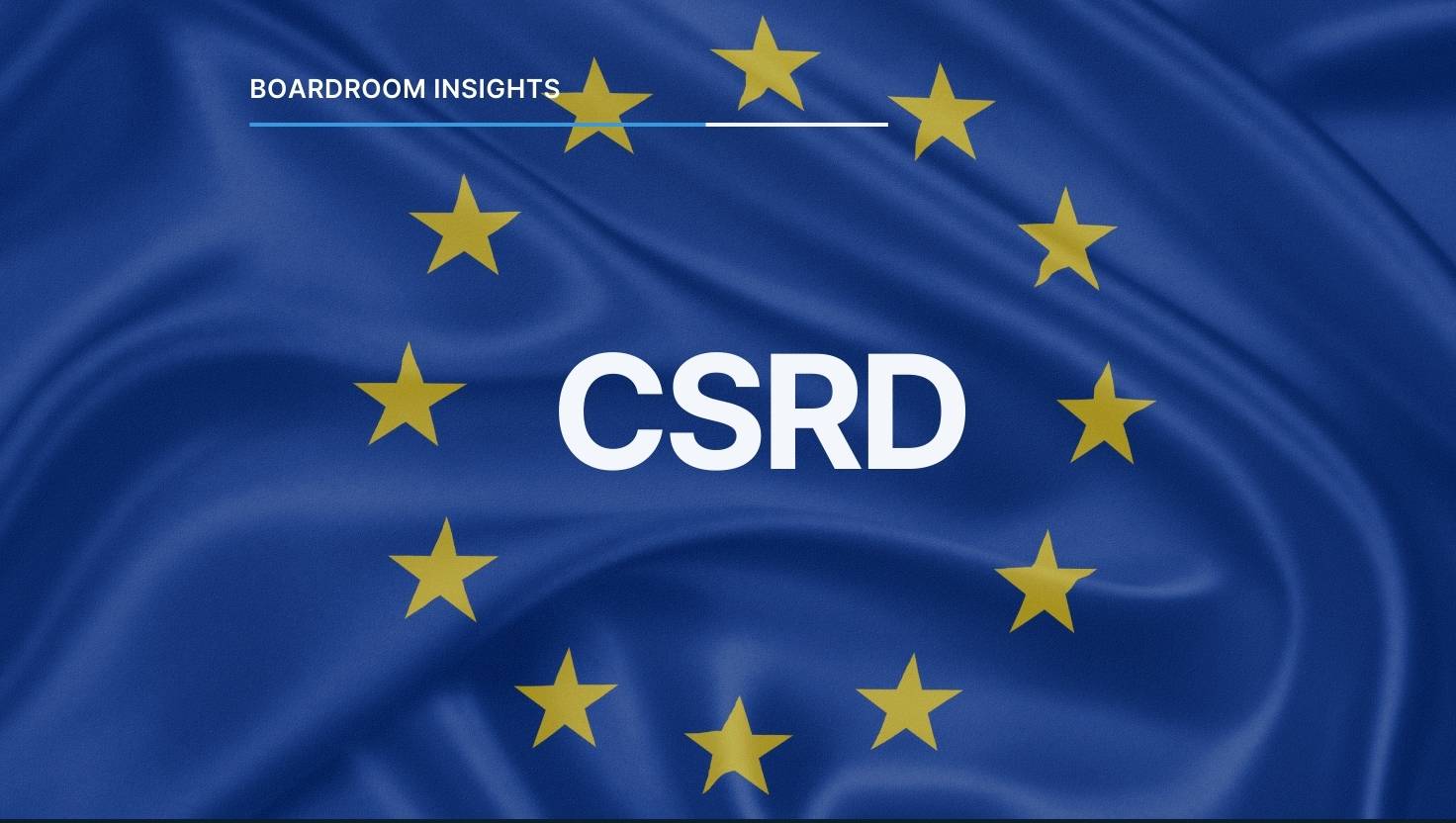
The Corporate Sustainability Reporting Directive: A Game Changer for Boardrooms
Explore how the Corporate Sustainability Reporting Directive (CSRD) is reshaping board dynamics, requiring boards to rethink their roles, expertise, and approach to long-term sustainability.
Ludovic Laffineur
CPTO at Govrn
The Corporate Sustainability Reporting Directive: A Game Changer for Boardrooms
The Corporate Sustainability Reporting Directive (CSRD) represents one of the most significant shifts in corporate governance in recent years. This deep dive explores how this directive is transforming boardrooms across Europe and beyond.
This isn’t just another regulatory compliance measure—CSRD is sparking a fundamental rethink of how boards operate, prioritize, and lead. From environmental and social reporting to rebalancing power dynamics, CSRD is poised to reshape the corporate landscape as we know it.
What is CSRD and Why Should Boards Care?
CSRD requires companies to report on their social and environmental impact across the entire value chain—not just internally, but upstream (suppliers) and downstream (product usage and disposal). Think of it as moving beyond financial reports, which provide a snapshot of financial health, to a panoramic film capturing how a company interacts with the world.
“CSRD requires companies to identify and report on the ESG issues most material to their business and stakeholders.” – Ludovic Laffineur
For boards, this means grappling with complex issues like:
- Global supply chains
- Climate risk assessments
- Human rights impacts
Why It Matters:
- Transparency: CSRD demands unprecedented transparency, empowering investors and stakeholders to assess genuine sustainability efforts.
- Accountability: Boards are held accountable for a broader set of stakeholders, not just shareholders.
- Opportunity: Embracing CSRD can position companies as sustainability leaders, attracting responsible investors and enhancing brand reputation.
From Box-Ticking to Strategic Thinking
Traditionally, governance has often been a box-ticking exercise. CSRD changes that. It pushes boards to move beyond compliance and embed sustainability into strategy. Our AI-powered compliance monitoring helps boards stay ahead of regulatory requirements while focusing on strategic initiatives.
“CSRD is more than another report—it’s prompting boards to rethink their roles and responsibilities.” – Ludovic Laffineur
To navigate this shift, boards need to:
- Develop a deep understanding of environmental, social, and governance (ESG) factors.
- Bring diverse expertise and high EQ (emotional intelligence) to interpret ESG data and drive constructive debate.
- Foster open communication to address conflicting viewpoints and embrace collaborative leadership.
Challenges and Risks Boards Must Address
1. Data Overload and Analysis Paralysis
CSRD reporting generates vast amounts of ESG data. Boards must focus on material issues—those most impactful to their business and stakeholders. Our AI assistant helps analyze and distill complex ESG data into actionable insights.
“It’s about finding the right balance between being comprehensive and avoiding analysis paralysis.”
2. Greenwashing Risks
Companies may feel pressured to appear sustainable without meaningful action. Boards must ensure integrity and transparency in reporting.
3. Conflicts of Interest
Personal ties to suppliers or other stakeholders could create tensions. Strong governance structures and clear disclosure policies are critical.
Solution: Implement robust recusal processes where impartiality is questioned.
Opportunities: CSRD as a Catalyst for Innovation
CSRD isn’t just about risk—it’s about unlocking opportunity. Companies that embrace the directive can:
- Attract ESG-focused investors looking for trustworthy sustainability initiatives.
- Enhance their brand reputation as leaders in sustainability.
- Foster innovation across their supply chains, products, and business practices.
“CSRD could be a win-win for companies and the planet, driving innovation and creating lasting value.”
Evolving Boardroom Competencies
Implementing CSRD requires a shift in board composition and expertise. It’s no longer enough to rely solely on financial wizards. Boards need members who bring:
- ESG expertise to navigate sustainability reporting.
- Interpersonal skills to foster collaboration and navigate tough discussions.
- Diverse perspectives to challenge assumptions and avoid biases.
Scenario planning and tools like premortems can help boards anticipate potential pitfalls and make more robust decisions. Our document collaboration platform enables seamless sharing and discussion of these critical analyses.
“Imagine it’s a year in the future, and your decision has failed spectacularly. What went wrong? That’s a premortem.”
Shaping the Future of Corporate Leadership
CSRD’s impact goes beyond the boardroom. It’s reshaping corporate leadership and ushering in the era of the Sustainable CEO—leaders who:
- Balance profit and purpose.
- Demonstrate stakeholder engagement skills.
- Commit to long-term value creation.
This shift also rebalances power dynamics, empowering boards to champion sustainability and advocate for long-term success.
“CSRD gives boards the tools to push back against short-term pressures and focus on what’s best for all stakeholders.”
Key Takeaways for Boards
As boards grapple with the challenges and opportunities of CSRD, here are three priorities to focus on:
-
Competency is Paramount
Build a board with the expertise to interpret ESG data, drive strategy, and manage change effectively. -
Embrace Collaboration and Communication
Move beyond traditional top-down dynamics. Foster open, inclusive discussions to leverage diverse perspectives. -
Think Long-Term, Act Strategically
CSRD isn’t just about compliance—it’s about creating a sustainable future that drives value for your business and the planet.
Final Thoughts
The Corporate Sustainability Reporting Directive is a catalyst for change. It challenges boards to rethink their roles, prioritize sustainability, and lead their organizations toward a better future.
By embracing CSRD, companies can move beyond compliance and seize opportunities to create lasting value for all stakeholders.
The question remains: Are your board and leadership team ready to rise to the challenge?
